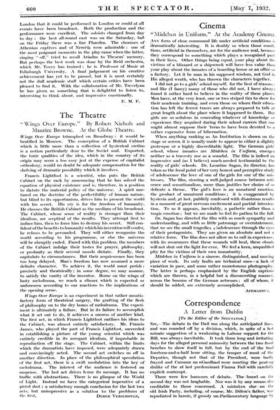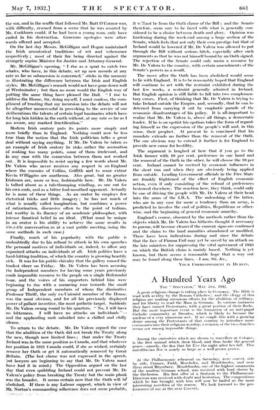Correspondence
A Letter from Dublin
[To the Editor of the SPECTATOR.] Sur,—The debate in the Dail ran along the anticipated lint's. and was rounded off by a division, which, in spite of a last minute suggestion of a weakening in Labour support for tile Bill, was always inevitable. It took three long and irritating days for the alleged personal animosity between the two front benches to show itself in full, but by the end 'of dhe final fourteen-and-a-half hour sitting, the temper of most•of the Deputies, though not that of the President, were • badly frayed and Cumann na nGaedhael were meeting the-pent-up dislike of the at last predominant Fianna Fail-with carefully 'explicit contempt.
There were few humours, of debate. The '■brawl.-on the second day was-not laughable. Nor was it by any means dis- creditable to those concerned. A mistaken slur: On the old Irish Party, includim4,,of course, Mr.. Dillores..father,' iva, repudiated in heroic, if grossly un-Parliamentary language by
the son, and in the scuffle that followed Mr. Batt O'Connor was, with difficulty, rescued from a scene that he was assured by Mr. Cockburn could, if he had been a young man, only have ended in his destruction. Generous apologies were after- wards offered and accepted.
• On the last day Messrs. McGilligan and Hogan maintained the annatorical traditions of wit and vehemence respectively ; most of their fire being directed against the strangely supine Minister for Justice and Attorney-General.
Ma McGilligan's opening, " I rise as a sprat to catch two whales, who have, in this- debate, set up new records at any rate as far as submersion is concerned," sticks in the memory as illustrating the difference between the Trials and English styles. Mr. MeGilligan's remark would not have gone down well at Westminster ; but then no more would the English way of putting the . same thing have pleased the Dail. " I rise to address the House, Sir, doing myself, I must confess, the com- pliment of trusting that my incursion into the debate will not be altogether unsuccessful in provoking to the service of our deliberations the talents of certain legal luminaries which have for long lain hidden in the earth without, itt any rate so far as I ant aware, any marked fructification."
MOdern Irish oratory puts its points more simply and more briefly than in England. Nothing could now be less true than the notion that the Irish politician talks a great deal without saying anything. If Mr. De Valera be taken as an example of Irish oratory he risks rather the accusation Of making too many points, some of them irrelevant, and 111 any (See with the connexion between Diets' not worked out. : It is impossible to resist saying a few words about Mr.
Valera who never receives any respect in an England where the enemies of Collins, Griffith and to some extent Kevin O'Higgins are anathema. Also great, but no greater Irishmen, are, more or less, fashionable here. Mr. He Valera is talked about as a tub-thumping windbag, as one out for his own ends, and as a bitter foul-mouthed opponent. Actually he is none of these things. As an orator he employs few rhetorical tricks and little imagery ; he has not much of what is usually called imagination, but combines a power of- ratiocination, discursive often to the point of tedium, but worthy in its fluency of an academic philosopher, with intense fanatical belief in an ideal. (What must be unique in an orator is his ability to achieve the same results in tele-it-tete conversation as at a vast public meeting, using the same methods in each case.) Finally, much of his popularity with the public is undoubtedly due to his refusal to attack in his own speeches the personal motives of individuals or, indeed, to allow any organized attacks on individuals at all. Irish politics have a hard-hitting tradition, of which the country is growing heartily sick. It was for his public chivalry that the gallery roused the loudest cheer on Friday. Mr. He Valera has been accusing the Independent members for having some years previously made impossible recourse to the people on it single Heferendal issue, and: the voices of his supporters behind him were beginning to rise with a menacing roar towards the small group,. of Independent members of whom the diminutive _Professor Thrift., the only ex-Unionist member of the House. was the most obvious, and for all his previously displayed power of gallant invective, the most pathetic target. Suddenly Mr. De Valera swung round to his quarters. " No, I will have no bitterness. I will have no attacks on individuals "- and the applauding mob subsided into a chilled and chilly
silence. •
To return to the debate. Mr. He Valera argued the ease that thelibolition of the Oath did not break the Treaty. along the new, though now limited lines ; that under the Treaty Ireland was in the same position as Canada, and that whatever her position in 1921 Canada could, if she so wished, certainly remove her Oath or get it automatically removed, by Great Britain.- (The • last clause was not expressed in the speech, but lawyers are beginning to say that Mr. De Valera must • have had it in mind.) The Opposition argued on the last day that even quibbling Ireland could not prevent Mr. He .Valent's- policy, from breaking the Treaty but the main plank was the broader. - -It seems certain now that the Oath will be -abolished. If there is any Labour support, which in view of Mr: Norton's commanding adherence does not seem probable,
it wllnot be from the Oath clause of the Bill : and the Senate therefore, seem sure to be faced with what is generally con- sidered to be a choice between death and glory. Opinion was hardening during the week-end among a large section of the Senate, which feels that not only their own prestige but that of Ireland would be lowered if Mr. He Valera was allowed to put through the Bill without serious hitch, especially after such arguments as that he was not himself bound by an Oath signed. The rejection of the Senate could only mean a recourse by Mr. De -Valera to the country, with certain amendments of the Senate's powers as a result.
The move after the Oath has been abolished would seem to lie with England. It is to be reasonably hoped that England
will eons' to act with the restraint exhibited during the last few weeks, it restraint generally admired in Ireland. But English opinion is still liable to fall into two complemen- tary errors. First, of thinking that Mr. De Valera is trying to take Ireland outside the Empire, and, secondly, that he can be deterred from carrying it out by emphatic parade of the economic disadvantages of his policy. it is all-important to realize that Mr. De Valera is, above all things, a democratic leader. If he is an egotist his egotism takes the form of regard- ing himself as the expression of the people's will and, in this sense, their prophet. At present he is convinced that his mandate extends no further than the removal of the Oath. The one obvious way to extend it further is for England to provide new cause for hostility.
The argument is laughed at here that if you go to the Irish farmer with 10 per cent. preference in one hand and the removal of the Oath in the other, he will choose the 10 per cent. Ireland , cannot be coerced by eem llllll ie influences in the short run and when they are obviously being applied from outside. Leading Government officials in the Free State are frankly frightened of the effect of English economic action, even if unl• consisting of the refusal of preferences bestowed elsewhere. The reaction here, they think, could only he one of driving the people with Mr. De Valera at their head into the arms of the I.R.A. The unleashing of the latter, who are in any case far more a tendency than an army, is predicted to involve the end of politics, Republican or other- wise, and the beginning of general economic anarchy.
England's course, obscured by the methods rather than the objects which Mr. De Valera has hitherto thought it necessary to pursue, will become clearer if the current signs are confirmed and the claim to the land annuities abandoned or modified. There have been indications during and since the debate that the face of Fianna Fail limy yet he saved by an attack on the late ministers for suppressing the vital agreement of 1023 on which the British claim is mainly based. Nothing is yet known, but there seems a reasonable hops• that a way out may be found along these lines.--I tun, Sir, &e., YOUll CORRESPONDENT IN DUR1.1N,







































 Previous page
Previous page